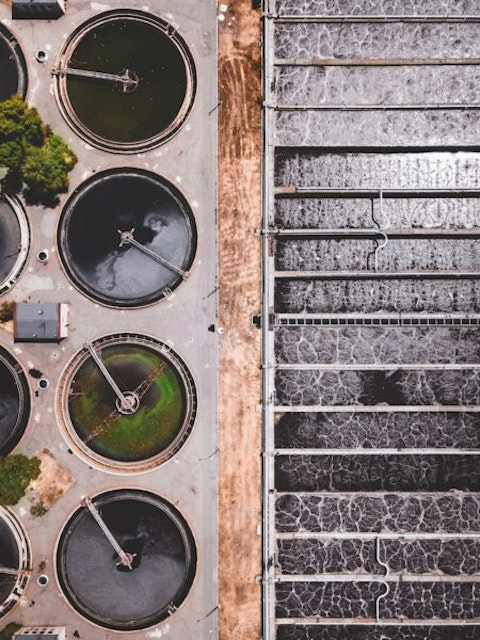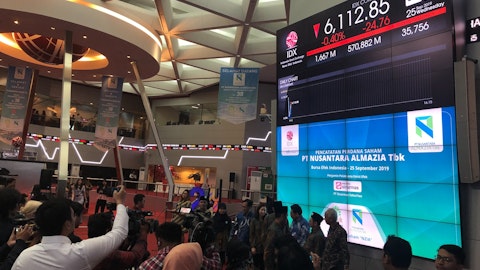Pentair plc (NYSE:PNR) Q4 2022 Earnings Call Transcript January 31, 2023
Operator: Welcome to the Pentair Fourth Quarter 2022 Earnings Conference Call. All participants will be in listen-only mode. After today’s presentation, there will be an opportunity to ask questions. Please note this event is being recorded. I would now like to turn the conference over to Shelly Hubbard, Vice President, Investor Relations. Please go ahead.
Shelly Hubbard: Thank you, Kate, and welcome to Pentair’s fourth quarter 2022 earnings conference call. On the call with me are John Stauch, our President and Chief Executive Officer; and Bob Fishman, our Chief Financial Officer. On today’s call, we will provide details on our fourth quarter and full year performance as outlined in this morning’s press release. On the Pentair Investor Relations website, you can find our earnings release and slide deck, which is intended to supplement our prepared remarks during today’s call and provide a reconciliation of differences between GAAP and non-GAAP financial measures that we will reference. The non-GAAP financial measures provided should not be considered as a substitute for or superior to the measures of financial performance prepared in accordance with GAAP.
They are included as additional clarifying items to aid investors in further understanding the company’s performance in addition to the impact these items and events have on the financial results. Before we begin, let me remind you that during our presentation today, we will make forward-looking statements, which are predictions, projections or other statements about future events. Listeners are cautioned that these statements are subject to certain risks and uncertainties, many of which are difficult to predict and generally beyond the control of Pentair. These risks and uncertainties can cause actual results to differ materially from our current expectations. We advise listeners to carefully review the risk factors in our most recent Form 10-Q and Form 10-K and today’s release.
We will also reference certain non-GAAP measures. Following our prepared remarks, we will open the call up for questions. Please limit your questions to one plus a follow-up, then re-enter the queue in order to allow everyone an opportunity to ask questions. I will now turn the call over to John.
John Stauch: Thank you, Shelly, and good morning, everyone. Let’s begin with Slide 4, titled Executive Summary. We closed out 2022 with strong sales, segment income and adjusted EPS, which is a direct result of the hard work and dedication of our focused employees across the world. Sales increased 9% to $4.1 billion; segment income rose 12% to $768 million; ROS expanded by 40 basis points to 18.6%; and adjusted EPS increased 8% to $3.68. A few of our key wins during the year include: strategic progress on our transformation initiatives, which we expect to drive significant margin expansion over the next several years; the acquisition of Manitowoc Ice, a complementary and accretive acquisition which further enhances our commercial water solutions business; and recognition for our leadership in social responsibility and sustainability.
All in, we are focused on building the Pentair in the future by investing in sustainable growth and expanding profitability through strengthening our operational and financial foundation, which we expect to create long-term value for our stakeholders. Bob will discuss our first quarter and full year 2023 guidance in more detail, but I wanted to share some thoughts. We are confident in our business model, diversified portfolio and our transformation initiatives, which we expect to drive long-term shareholder value and contribute significantly to 2023. As we look specifically at 2023, we are working through near-term macroeconomic-driven challenges, which we are driving — which is driving lower-than-expected volumes in our residential businesses.
However, we expect to see more normalized demand in 2024 and view 2023 as a catch-up year for excess demand that was realized in 2020 through the first half of 2022. Please turn to Slide 5, titled 5 Year Pentair Performance. Reflecting on the last five years is a focused, smart, sustainable water solutions company. We drove strong financial performance by: increasing revenue at an 8% compounded annual growth rate; increasing EPS at a 14% compounded annual growth rate; and we have also generated over $2 billion of free cash flow; and ended 2022 with nearly a 16% ROIC. These are metrics that we are very proud of and share with our incredible team here at Pentair. This is a testament to our relentless efforts to deliver premium quality, innovative products and services to our consumers.
We believe the largest opportunity is improving ROS, which did not improve materially over the last five years. The strong demand we realized later in 2020 through the first half of 2022 came with disrupted supply chains and unprecedented inflation that was hard to outpace. We believe our second half of 2022 demonstrates that we have finally made progress on price versus cost. However, we still have significant opportunities to improve our operating and cost efficiencies across all of Pentair through transformation and recovery of the inefficiencies that we realized. Please turn to Slide 6, labeled Pentair at a Glance. For those of you listening today who may be new to our story, I wanted to reiterate a few important key metrics that I discussed last quarter.
In 2022, we generated $4.1 billion in sales with approximately a 50% mix from residential channels and 50% from commercial, industrial and infrastructure channels. We have decent profitability at 18.6%, but as I mentioned previously, we have a lot of opportunity to improve this. We believe our large installed base is an advantage and an opportunity for us. For example, 75% of our products are replacement inside a large installed base that benefits from over 75,000 focused trade partners. We believe these relationships with our trade channel partners drive resiliency of revenue and create a great opportunity for continued growth as we introduce new products and technologies. We have a long successful track record of generating cash flow and being disciplined with our capital allocation.
In fact, we have increased our dividend for the 47th consecutive year, putting us in a very small group inside of the S&P 500, and we are especially proud of our high-teens ROIC, demonstrating that we continue to be good stewards with your invested money. We believe we have a very solid foundation and we know there’s still more we can do. Please turn to Slide 7, labeled Our Impact: Making Better Essential for People and the Planet. Our work on ESG and social responsibility continues to be at the forefront of how we operate and how we work to make the planet better. At Pentair, we take great pride in the products we develop that are providing solutions to some of the world’s largest challenges, including safe and healthy drinking water, climate change and water shortages to name just a few.
We also seek to make better essential for people and the planet. For example, our products and solutions improve water efficiency, reduce and capture carbon emissions and avoid the need for single-use water bottles. Here are a few highlights. 71% of Pentair solutions support water efficiency; 15.9 million tons of CO2 emissions have been avoided by U.S. consumers using Pentair’s energy efficient pool pump since 2005; and nearly 8 billion single-use plastic water bottles have been avoided in 2022 due to Pentair’s water filtration products. Furthermore, our leadership and social responsibility is being recognized by third-party organizations, including Forbes and others. We look forward to continued progress and plan to share additional details in our 2022 Corporate Responsibility Report, which we expect to publish this spring.
Please turn to Slide 8, labeled Strategic Framework. Our purpose, mission, vision, values and impact are critical components of our strategic framework. Our purpose matters and is to create a better world for people in the planet through smart sustainable water solutions. Our mission as a company is to help the world sustainably move, improve and enjoy water, life’s most essential resource. And we do this in residential, commercial, agriculture and industrial applications. As of January 1st of this year, we have split our Consumer Solutions segment into Pool and Water Solutions. This creates three focus segments as IFT remains unchanged. We expect this to not only improve transparency, but further improve customer service, differentiate our products, measure our success externally and drive greater profitability for our shareholders.
Our three segments are now Industrial & Flow Technologies, Water Solutions and Pool. We continue to see great opportunity in all three of these segments and the businesses that each of them lead. Our Industrial & Flow Technologies segment helps move water where you need it, when you need it more efficiently in our pump businesses. The segment also focuses on transforming waste into value through our sustainable gas and membrane businesses. Our Water Solutions segment, which includes our most recent acquisition, Manitowoc Ice, is a leading platform to provide water and ice to our food service and residential customers. These businesses improve water by providing great tasting, higher-quality water and ice while helping our customers use more — water more productively.
Our Pool business helps enjoy water by using less energy and chemicals. In North America, it also has a large installed base of approximately 5.4 million pools with an average age of 20 to 25 years. The industry is approximately 60% break and fix, 20% major remodeling, and 20% new pools. Only about 50% of all in-ground pools have some form of automation, which we believe is a long-term opportunity for Pentair. I will now pass the call over to Bob, who will discuss our performance and financial results in more detail. Bob?
Bob Fishman: Thank you, John, and good morning, everyone. Please turn to Slide 9, labeled Q4 2022 Pentair Performance. I will also be discussing our full year performance on Slide 10. We delivered fourth quarter sales growth of 1% with core sales declining 3% as strong price contribution was not enough to offset volume decline. Consumer Solutions core sales were down 11%, as expected and previously communicated, due to residential channel inventory levels rebalancing and as a result of our lead times beginning to return to more normal levels. Industrial & Flow Technologies reported strong 11% core sales growth with strength in commercial flow and industrial solutions. For the full year, sales grew 9% with core sales up 6%. Consumer Solutions delivered 4% core sales growth, and Industrial & Flow Technologies saw core sales growth of 10%.
Fourth quarter segment income increased 10%, and return on sales expanded 130 basis points year-over-year to 18.2%, driven primarily by price, significantly offsetting inflation. Productivity was negatively impacted by lower volume in the quarter. Adjusted EPS of $0.82 was down 6% versus the prior year, but exceeded our guidance for the quarter. Net interest and other expense was $28.2 million, which represented our first full quarter of new financing post the Manitowoc acquisition. And our adjusted tax rate was 12.7% during the quarter, with a share count of 165.2 million. For the full year, segment income grew 12% and return on sales expanded 40 basis points to 18.6%. Adjusted EPS increased 8% for the year to $3.68. Our tax rate ended the year at 14.5%, and our share count was 165.6 million.
Please turn to Slide 11, labeled Q4 2022 Consumer Solutions Performance. In addition to the fourth quarter performance for Consumer Solutions, I will also be referencing the full year performance on Slide 12. In the fourth quarter, Consumer Solutions sales declined 1% with core sales declining 11%, comprised of 15 points of price, offset by 26 points of volume decline. This was in line with our expectations. The volume decline was due to difficult year-over-year comparisons and the anticipated inventory correction across many product lines in our residential channels. Segment income grew 7%, and return on sales expanded 150 basis points to 23.1%, as strong pricing measures continued to play out along with the contribution from Manitowoc Ice.
For the year, Consumer Solutions sales grew 12% with core sales up 4%. Segment income grew 10%, and return on sales declined 40 basis points to 23.3%. Our pool business had sales growth of 4% for the year. Water treatment saw sales growth of 28%, led by contribution from the Manitowoc Ice acquisition, which was completed at the end of July. Please turn to Slide 13, labeled Q4 2022 Industrial & Flow Technologies Performance. In addition to the fourth quarter performance for Industrial & Flow Technologies, I will also be referencing the full year performance on Slide 14. Industrial & Flow Technologies grew sales 5% in the quarter, partially offset by a 4% FX headwind with core sales increasing 11%. Segment income grew 21%, and return on sales expanded an impressive 240 basis points to 17.4%, marking the second consecutive quarter of greater than 200 basis points of improvement.

Photo by Ivan Bandura on Unsplash
The strong margin expansion was a result of significant price contribution and moderating inflation. For the year, sales increased 6% with core sales increasing 10%. Segment income grew 14%, and return on sales increased 110 basis points to 16.1%, as strong price more than offset inflation and FX headwinds. IFT saw sales growth across the segment with residential flow up 3%, commercial flow up 6% and industrial solutions up 10%. Please turn to Slide 15, labeled Balance Sheet and Cash Flow. As a reminder, this slide reflects the closing of the Manitowoc acquisition at the end of July. We ended the quarter with pro forma a leverage of 2.5 times, and our return on invested capital was at 15.7%, declining slightly due to the acquisition of Manitowoc Ice.
I would like to remind you that given the rising interest rate environment, we are comfortable being two-thirds variable as we were less inclined to lock into higher rates for longer. We have no significant long-term debt maturing for the next few years and the majority of our debt is in term loans going out three to five years. We generated $283 million of free cash flow from continuing operations in the year, which was in line with our messaging on the Q3 earnings call. Working capital was a significant headwind this year, primarily inventories, which has led to a timing issue on cash flow. Our inventories were higher largely due to inflation, (ph) and inefficiencies in the supply chain. We expect to benefit from working capital improvement in 2023 and generate free cash flow in line with our historical performance of 100% of net income.
In 2022, we returned roughly two-thirds of our free cash flow to shareholders through dividends and share repurchases. We plan to remain disciplined with our capital, and we’ll continue to focus on debt reduction amid the higher interest rate environment. Please turn to Slide 16, labeled Segment Structure Beginning in 2023. As John discussed, we moved to three reporting segments effective January 01, 2023. We have included realigned historical information for these segments from 2019 to 2022 in the supplemental data section of our earnings presentation. Our Industrial & Flow Technologies segment had roughly $1.5 billion of revenue in 2022 with a ROS of approximately 16%. This business grows sales at roughly single digits over the long term in a very large industry.
Water Solutions consists of residential and commercial and was roughly $1.2 billion of revenue on a pro forma basis when including a full year of Manitowoc Ice. This is a mid-single digit sales growth contributor over the long term, operating in a very large industry. Finally, Pool was roughly $1.6 billion of revenue in 2022 and is our highest profitability segment that we expect will grow sales mid-single digit plus over the long term. Please turn to Slide 17, labeled Transformation Expectations. We have moved transformation from funnel to execution, and we expect more material benefits to contribute to our longer-term margin expansion targets. In 2022, we made strategic progress on our transformation initiatives with a primary focus on two of our four key themes: pricing excellence and strategic sourcing.
Overall, we believe transformation will be a key driver in value creation over the next three years. For example, through our transformation initiative, we have identified over 400 basis points of targeted margin expansion by 2025, up from the 300 basis points that we discussed at our previous Investor Day. A significant portion of that is due to a focus on material costs, which represent roughly 40% of our sales. By driving transformation excellence through pricing and sourcing, we believe this will have the most significant impact on overall cost efficiencies. With the work we have completed in 2022, we believe that we can expand return on sales to approximately 23% in 2025. In pricing, we have completed wave one, which has established a new strategic pricing playbook.
This creates a foundation for pricing across our different go-to-market strategies and includes looking at our dealer and distributor programs to better optimize them. We are gaining insight into profitability by customer and product category and using this data to better drive our forecast. We believe pricing remains a big opportunity. We are building capabilities and starting to see benefits materialize. We expect future waves to include the implementation of our pricing playbook across all categories. We are furthest along in our strategic sourcing initiatives. We have completed wave one that focused on key categories, like electronics, motors and drives, castings, packaging, logistics and MRO. Wave one included roughly 35% of material spend and has generated over 12% in savings opportunities.
We expect to unlock value through supplier-dedicated resources, supply base reduction, inventory solutions, enhanced supplier executive level relationships and rebate programs. We expect to reduce complexity across our entire organization and to see close to 80% supplier reduction in some of our commodity groups. Over 75 Pentair team members attended 3,000 plus hours of formal classroom instruction and workshops in supply chain topics. As we institutionalize our wave one learnings, we expect this will drive future waves as we look at additional categories. Wave two is scheduled to start in 2023 and is planned to cover another 35% of material spend for commodity groups such as metals, plastics and molding, purchase finished goods, transportation, and indirect spend such as IT, fleet management and office supplies.
We expect this will create a funnel of savings for 2023 and 2024. In operations excellence, we are focused on reducing complexity and driving lean processes across all our operations. In 2022, we made a few small strides on footprint optimization. We believe this presents longer-term opportunities, but not until 2024 and beyond, as we build out the funnel. Lastly, in organizational effectiveness, we are focusing on sales and functional excellence to simplify our organization. From an organizational standpoint, we believe ample opportunities remain for complexity reduction across the entire portfolio and a realignment of needed skills within our top priorities. We continue to believe that our transformation initiatives will be a large value creation opportunity for Pentair.
Please turn to Slide 18, labeled Q1 and Full Year 2023 Pentair Outlook. For the full year, we are introducing adjusted EPS guidance of approximately $3.50 to $3.70, which represents a year-over-year range of down 5% to up 1%. We expect sales to be roughly down 3% to up 1%. We expect segment income to increase 5% to 10%, with corporate expense of approximately $80 million, net interest expense of roughly $125 million, an adjusted tax rate of approximately 15% and a share count of 165 million to 166 million. We are targeting free cash flow of approximately 100% of net income as we expect working capital to improve and inventory levels to come down. For the first quarter, we are introducing adjusted EPS guidance of approximately $0.76 to $0.78, which represents a year-over-year decrease of approximately 8% to 11%.
We expect sales to be roughly flat to up 1%, as the contribution of Manitowoc Ice helps offset expected volume declines from the rebalancing of residential channel inventory. We expect segment income to increase 5% to 8%, with corporate expense coming in around $21 million, net interest expense of roughly $33 million, an adjusted tax rate of approximately 15% and a share count of 165 million to 166 million. Please turn to Slide 19, labeled Full Year 2023 Guidance at Midpoint. The chart on Slide 19 shows a walk of sales and segment income at the midpoint of our full year 2023 guidance. From the sales walk on the left-hand side, you will see that we expect sales to be down roughly 1% at the midpoint. We expect volume to be down approximately 10%, primarily due to our residential businesses.
We expect price benefit of approximately 5% and a benefit from acquisitions/divestitures of roughly 5%, primarily due to a full year of Manitowoc Ice, partially offset by exits in the residential businesses and water solutions. We expect Pool sales to be down low double digits at the midpoint in 2023 after growing 14% in 2020, 40% in 2021 and 4% in 2022. We believe 2023 will be an inventory rebalancing year across the pool industry. We do think that there was a higher-than-normal level of demand in 2020 and 2021 that led to timing and supply chain disruptions in the industry and, therefore, created larger-than-normal impact between sell-through and sell-in reflected in our results. We estimate that from a sell-through perspective, the overall industry grew about 4% on a volume basis from 2019 to 2022, roughly in line with historical levels.
As we have discussed, our Pool sales consists of 20% from new pools 20% from remodels and 60% from the aftermarket. At the midpoint, we expect that new pools and remodels will be down approximately 20% in 2023 and the aftermarket business, including inventory corrections in Q1 through Q3, will be down approximately 15%. We expect price carryover for Pool will be up roughly mid-single digit. We do expect the industry and our Pool revenue to return to more normalized growth later in 2023 and in 2024, reflecting a more even balance of sell-through and distribution buying patterns. As a reminder, even with an expected (ph) year of down double digits in 2023, we expect to grow at a double digit CAGR in Pool from 2019 through 2023. We expect our Water Solutions segment sales to be up mid-teens at the midpoint, including up approximately 40% in our commercial business with a full year of Manitowoc Ice and down approximately 10% in our residential business.
We expect IFT sales to be up slightly at the midpoint with the commercial, industrial and infrastructure businesses up approximately mid-single digits and residential down approximately double digits. On the segment income side, we expect segment income to grow approximately 8% at the midpoint and to expand ROS roughly 150 basis points. We expect price to slightly exceed inflation. We expect approximately 35% ROS from our acquisitions and divestitures. Our transformation initiatives and productivity should deliver over 200 basis points of margin expansion. And we expect drop through of roughly 30% on the decrease in volume. We expect our greater than 200 basis points of transformation and productivity benefit will be the result of volume rightsizing actions that we undertook in the fourth quarter of 2022, inefficiencies in our 2022 results that will not repeat in 2023 and our transformation initiatives.
Our comments are based on the midpoint of the range. The lower end of our range would be reflective of higher interest rates, impacting housing demand and residential sales and increasing our interest expense. As we think about the higher end of our range, our main drivers would be a better outcome in the residential businesses, primarily Pool, and overdriving some of the transformation benefits. In closing, we expect the lower Pool year in 2023 to be offset by the strength of our diversified portfolio and our transformation initiatives. We are confident in the expected benefits from our transformation initiatives and we believe we are gaining continued momentum, to not only drive savings in 2023, but to build a strong funnel for 2024 and 2025, with significant ROS expansion.
We also expect ROS expansion as our residential businesses return to more normalized growth in 2024 and beyond. I’d now like to turn the call over to the operator for Q&A, after which John will have a few closing remarks. Kate, please open the line for questions. Thank you.
See also 10 Best February Dividend Stocks To Buy and 10 Hot Oil Stocks To Buy .
Q&A Session
Follow Pentair Plc (NYSE:PNR)
Follow Pentair Plc (NYSE:PNR)
Receive real-time insider trading and news alerts
Operator: We will now begin the question-and-answer session. The first question is from Joe Giordano of Cowen. Please go ahead.
Joe Giordano: Hey guys, good morning.
John Stauch: Good morning.
Bob Fishman: Hi, Joe.
Joe Giordano: Maybe, I’m going to start (ph) on Pool. Can you talk about the residential portfolio that you have within the old Consumer Solutions group? You made a couple of acquisitions over the years, Pelican, Aquion and Rocean, and small deals, but now we’re talking about some exits that you’re making. So, maybe just give us an update on where that portfolio is? Where is it maybe versus what you thought it might look like when you started making those deals? And kind of like an update on the strategy going forward from there?
John Stauch: Yes. I mean, first of all, I think about it as roughly still 40% of the overall Water Solutions segment. And think of all the core that we were focused on for the last five to ten years, which is really about the trade and the professional channel, all being a big part of our strategy and still performing. What we did exit was our attempts at the direct-to-consumer side of the business, which we felt were not going to gain the traction that we originally hoped they would, but also they were confusing the trade channel as far as our partnership to support them. And so, now we’re focused on being back to where we were, which is pulling demand through our professional trade channel and ensuring that we’re winning with the best products and solutions, Joe.
Joe Giordano: That makes sense. And then just a follow-up on the 2025 margin target. Can you maybe walk us through the relative contributions from the three segments? Like, I guess, Pool doesn’t have as much upside given how strong it’s been, but if you could kind of help us frame that up?
Bob Fishman: Yes. Joe, we were pleased to be able to increase the ROS expansion due to the — what we’re seeing in the transformation initiatives. We still have work to do to break it out by segment, but overall, we would expect each of the segments to be contributors to that ROS expansion.
John Stauch: And so, when you think of the increase in the target, as Bob mentioned, 100 basis points of that comes from candidly the fact that we’re mixing up with the Manitowoc acquisition. And then we felt like stepping up the expectations on the transformation was helpful for two reasons. One is, we believe that we’re making progress with the actual work we’re doing. But the second one is we have inefficiencies that we uncovered over the last couple of years of being challenged by the supply chain, which we want to make sure are included in the transformation journey that we’re on.
Bob Fishman: And just to bridge the gap, when we had our Investor Day, we talked about going from 18% to 21% in 2025. We then acquired Manitowoc. So that gave us another approximately 100 basis points to bring us to 22%, and then we found another 100 basis points in the transformation initiatives to get us to the 23%.
Operator: The next question is from Bryan Blair of Oppenheimer. Please go ahead.
Bryan Blair: Thank you. Good morning, guys.
John Stauch: Good morning.





